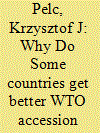|
|
|
Sort Order |
|
|
|
Items / Page
|
|
|
|
|
|
|
| Srl | Item |
| 1 |
ID:
107531


|
|
|
|
|
| Publication |
2011.
|
| Summary/Abstract |
The process by which countries accede to the World Trade Organization (WTO) has become the subject of considerable debate. This article takes a closer look at what determines the concessions the institution requires of an entrant. In other words, who gets a good deal, and who does not? I argue that given the institutional design of accession proceedings and the resulting suspension of reciprocity, accession terms are driven by the domestic export interests of existing members. As a result, relatively greater liberalization will be imposed on those entrants that have more valuable market access to offer upon accession, something that appears to be in opposition to expectations during multilateral trade rounds, where market access functions as a bargaining chit. The empirical evidence supports these assertions. Looking at eighteen recent entrants at the six-digit product level, I find that controlling for a host of country-specific variables, as well as the applied protection rates on a given product prior to accession, the more a country has to offer, the more it is required to give. Moreover, I show how more democratic countries, in spite of their greater overall depth of integration, exhibit greater resistance to adjustment in key industries than do nondemocracies. Finally, I demonstrate that wealth exhibits a curvilinear effect. On the one hand, institutionalized norms lead members to exercise observable restraint vis-à-vis the poorest countries. On the other hand, the richest countries have the greatest bargaining expertise, and thus obtain better terms. The outcome, as I show using a semi-parametric analysis, is that middle-income countries end up with the most stringent terms, and have to make the greatest relative adjustments to their trade regimes.
|
|
|
|
|
|
|
|
|
|
|
|
|
|
|
|
| 2 |
ID:
143528


|
|
|
|
|
| Summary/Abstract |
This article undertakes a cost and benefit analysis of Afghanistan’s accession to World Trade Organization (WTO) while attempting to shed light on the post-accession challenges. For the empirical part of our analysis, we have applied the WITS/SMART model to assess the implication of WTO membership. The partial equilibrium model embedded in World Integrated Trade Solution (WITS) allows users to estimate the impact of tariff reductions on trade flows, tariff revenue, and consumer surplus for a single market at a time. Tariff cut is an independent variable, and government revenue, trade creation, consumer welfare and general welfare of the economy are the other variables. The results show that Afghanistan consumers stand to benefit from tariff reforms with overall positive welfare gains to the economy. However, a reduction in tariff will lead to a fall in government revenue and a substantial increase in imports which may raise some concerns over the negative trade balance. The last section of the article studies the post-accession challenges of WTO accession with a special focus on developmental, institutional, legal and environmental challenges. Our analysis based on the sectoral mix of Afghanistan’s economy suggests that producers will lose out. Findings of this study support the argument to maintain maximum policy space for Afghanistan for its long-term development need purposes.
|
|
|
|
|
|
|
|
|
|
|
|
|
|
|
|
|
|
|
|
|